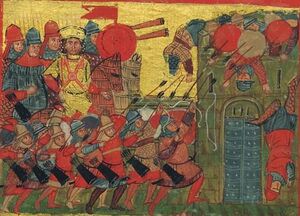Kaodsi: Difference between revisions
No edit summary |
|||
| Line 11: | Line 11: | ||
==Kaodsi== | ==Kaodsi== | ||
===Beginning of the ''Kaodsi''=== | ===Beginning of the ''Kaodsi''=== | ||
===Kuratid invasion and the reestablishment of the Messarian Kingdom=== | ===Kuratid invasion and the first reestablishment of the Messarian Kingdom=== | ||
===Breakup of the Khanate=== | ===Breakup of the Khanate=== | ||
===Third and fourth reestablishments of the Messarian Kingdom=== | ===Third and fourth reestablishments of the Messarian Kingdom=== | ||
Revision as of 18:42, 8 January 2021
This article is incomplete because it is pending further input from participants, or it is a work-in-progress by one author. Please comment on this article's talk page to share your input, comments and questions. Note: To contribute to this article, you may need to seek help from the author(s) of this page. |

The Kaodsi (Messarian for "chaos") was a period in the history of the Mengriian Peninsula which lasted from 762 to 1507. The majority of the period was marked by warfare between the various states of the peninsula, including mainly the kingdoms of Ingria, Zyguria, Makhuria, Meretia and Odakhia, three incidents of the reestablishment of the Messarian Kingdom (only one of which was successful in permanently unifying the peninsula), and the Kuratid invasion of 1210.
The beginning of the Kaodsi is usually placed marked at the Ingrian king John I Matrouni's besieging of the Meretian city of Mesuesta in 762. John did so over the succession of the Meretian crown, which he had a claim to through his wife, Theodora of Metrokhi. The siege was successful, and Mesuesta fell after eight months. Peter II, the Meretian king and also John's brother-in-law, who was in Grajara at the time, sent an army to pursue Matrouni's force, which was laden with plunder from its sacking of Mesuesta and subsequently moved at a slower rate. However, Matrouni caught word of this and called on his cousin, the Zygurian king Menelaus Savili for aid. Menelaus did so, and the combined forces of John and Menelaus met Peter's army in battle at Battle of Okrovelo, which resulted in a decisive victory for the Ingro-Zyurian force. Peter, however, escaped to Tskhyra on the Mereto-Odakh border, and from there sent his son, Gabriel Borvedze, to the Odakh king, Bataines Orumli in an attempt to forge an alliance.
The incentives behind the conquests undertaken vary from monarch to monarch. Most revolved around the succession of a kingdom, the acquiring of resources, or territorial expansion. A select few, such as the brief Playwright's War (named for its later usage in the poet Aëtees' popular comedic work, ''The King of the Pastures'') waged by Aslavakh I Tamardze of Makhuria (who was later given the Greek moniker Otrellos; "The Mad") against the small Greek kingdom of Chalkia in 1300. According to Luke IV, bishop of Besuesta, Aslavakh was bored of the peace and prosperity Makhuria was experiencing, and so decided he'd start a war to entertain himself. However, he was ambushed and defeated by a smaller Chalkian force in the Battle of Lagos Pass. The war ultimately lasted only a week.